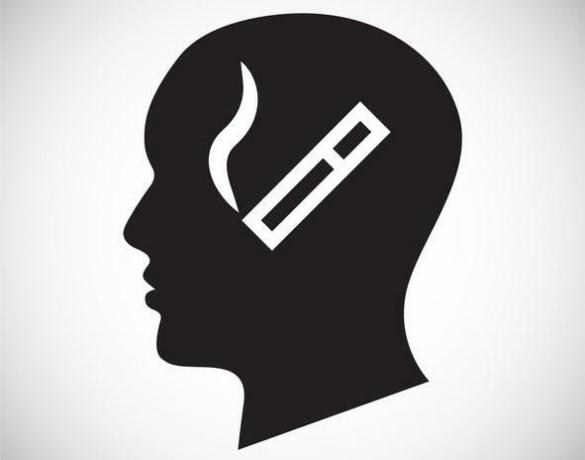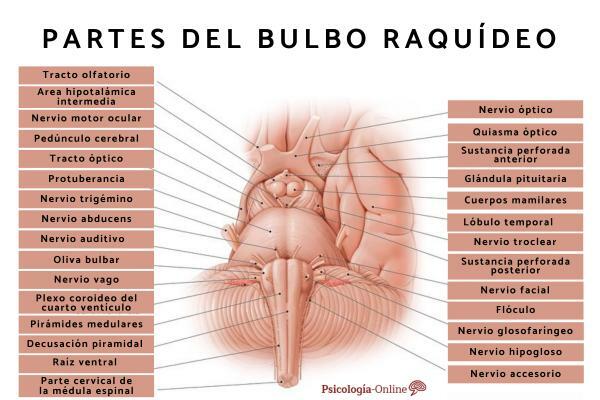
Currently, approximately 6 million people a year die from smoking. There are many known diseases derived from its consumption such as respiratory difficulties, cardiovascular diseases or lung cancer. Positioning the consumption of tobacco as an important problem in public health. However, diseases derived from the impact of tobacco on the body are not addressed from a neuropsychological perspective and even so, there are several factors that have an impact on brain function, due to the fact that physiological changes occur in certain brain structures, affecting people's quality of life and its proper functioning. Therefore, in this Psychology-Online article, we will expose which are the effects of tobacco on the brain.
Index
- Nicotine tobacco addiction
- Effects of tobacco
- Effects of tobacco on the brain
Nicotine tobacco addiction.
Smoking is defined as a syndrome that causes multisystemic damage slowly, at a progressive level, associated with nicotine dependence. This is characterized by the loss of control over the will to smoke, causing symptoms of abstinence in the face of the disappearance of the cigarette and later, causing relapses after a certain time no smoking.
The effects of nicotine on the nervous system and in the whole organism there are several. When smoking adrenaline secretion occurs in the brain, which stimulates the central nervous system and also stimulates dopamine production. Dopamine is the neurotransmitter related to motivation, euphoria, and pleasure. Dopamine activates the circuits responsible for feelings of pleasure, called reward circuits, so that smoking increases dopamine, thus increasing the sensation of pleasure or reward, which contributes to increasing its abuse. In addition, the effects of nicotine are triggered in an intense and short-term way, without the need for a reward in a natural way that stimulates feelings of pleasure, tobacco is the reward itself, which causes the continuous consumption.
In addition to this, the need for consumption (craving) leads the person into a vicious circle between preoccupation with wanting to use the substance, addiction, dependence, and withdrawal, leading back to craving. It should be noted that the craving produces a set of symptoms that can begin within a few hours of consuming a cigarette:
- Cognitive and attention deficit
- Sleep disturbances
- Increased appetite
To measure the level of addiction to nicotine, the most widely used instrument is the Fargerström test.
Finally, it should be noted that smoking has a cumulative effect, which makes it increasingly difficult for chronic smokers to quit smoking.
Effects of tobacco.
There are numerous effects produced by smoking, however the consequences tend to be considered distant and therefore do not cause much concern. However, nicotine and other components of tobacco can produce rapid onset changes in our body. Among the effects of tobacco we find:
- Bad skin appearance due to the contraction of the blood vessels, preventing the correct circulation of oxygen to reach the skin.
- Bad breath, which is not only present after cigarette consumption, but also the halitosis disorder, persistent bad breath, occurs in smokers.
- Performance in sport reduced because of shortness of breath, decreased circulation, or fast heartbeat.
- There is a increased risk of injury and slower healing due to the body's difficulty in producing collagen.
- Smoking also involves increased risk of disease like colds, flu, bronchitis ...
This set of effects appear shortly after smoking. However, there are many known diseases derived from its long-term consumption, such as lung cancer or cardiovascular diseases. In addition, several factors have been recognized that produce an impact on brain function, leading to neurocognitive damage in smokers.
Effects of tobacco on the brain.
There are many studies that show the growing evidence of tobacco causes a deterioration in the cerebral cortex in the long term, the process of which is accelerated by prolonged use of nicotine. Against this, smoking has been associated with a decreased function of neurocognitive abilities. Specifically, it has been related to structural abnormalities in the anterior frontal regions, the subcortical nuclei and the white matter, also producing global brain atrophy and reductions in the overall volume of the brain, thereby implying an impairment of executive functions and reductions in the density of the brain's gray matter.
This set of changes produced by the effect of tobacco in the brain, brings as a consequence the following neurocognitive disturbances:
- Executive functions: complex mental abilities, which direct our behavior and cognitive and emotional activity to achieve the proposed goals or objectives. Some of the executive functions that are affected in the long term by tobacco use are the following:
- Cognitive flexibility: ability to make changes to adapt to our environment.
- Planning: ability to generate the most appropriate action plans, bearing in mind the respective consequences.
- Reasoning skills: aims to solve problems from the establishment of causal relationships.
- Decision making: selection of alternatives taking into account the needs and derived consequences.
- Working memory: maintains, manipulates and transforms information.
- General intellectual abilities
- Memory processing speed
- Learning
- Decreased ability to perform some activities of daily living
- Compromised postural stability
- Increased risk of developing various forms of dementia, usually Alzheimer's disease and vascular dementia
- Impulse control difficulty
- Impaired judgment
- Difficulty in attention
These are some of the effects of tobacco on the brain, specifically, the neurocognitive consequences of chronic tobacco use found in the existing literature. However, the mechanisms that promote these alterations are not entirely clear, since longitudinal studies are needed to estimate it.
Finally, it should be noted that studies agree that quitting smoking would allow partial or total recovery of the size of the cerebral cortex, producing a regeneration of the cortex. In case you want to quit smoking, it is interesting to know how to combat anxiety when quitting smoking.
This article is merely informative, in Psychology-Online we do not have the power to make a diagnosis or recommend a treatment. We invite you to go to a psychologist to treat your particular case.
If you want to read more articles similar to Effects of tobacco on the brain, we recommend that you enter our category of Neuropsychology.
Bibliography
- Casas, M. (1991). Summary: Tobacco. British Journal of Addiction, 86, 677-686.
- Díaz, V., García, L., Sansores, R & Ramírez, A. (2014). Impact of smoking and COPD on brain functionl. Neumol Cir Thorax, 73, 196-204.
- Durazzo T., Meyerthoff D., Nixon S (2010). Chronic cigarette smoking: implications for neurocognition and brain neurobiology. Int J Environ Res Public Health, 7 (10), 3760-3791.
- Fried P., Watkinson B., Gray, R (2006). Neurocognitive consequences of cigarette smoking in young adults: a comparison with pre-drug performance. Neurotoxicol Teratol, 28 (4), 517-525.
- Fuentes, P., Barrós, A., Costumero, V., Bustamante, J., Rossell, P & Ávila, C. Changes in the regional volume of gray matter associated with tobacco use. Research Forum, 16, 16.


